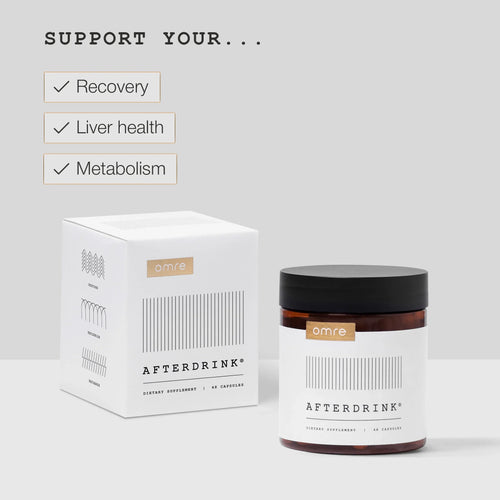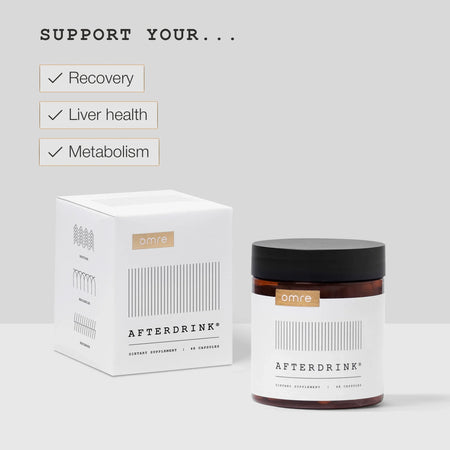Table of Contents
- WHAT ARE ELECTROLYTES?
- Do electrolytes hydrate you?
- ELECTROLYTES AND HYDRATION - WHAT'S THE LINK?
- HYDRATING FASTER WITH AN ORAL REHYDRATION SOLUTION
- WHAT TO LOOK FOR IN AN ELECTROLYTE DRINK FOR HYDRATION
- WHAT IS THE BEST WAY TO GET ELECTROLYTES FOR HYDRATION
- DO ELECTROLYTES HYDRATE YOU - FINAL WORDS
It's common for people to reach for an electrolyte drink when they're feeling the symptoms of dehydration.
But there's a lot of confusion around electrolytes and hydration. Do electrolytes actually hydrate you faster than plain water? and if so, how?
In this article, we take a closer look at understanding the relationship between hydration and electrolytes and clear up any myths or misconceptions surrounding it.
AFTERDRINK®
A supercharged antioxidant designed to support recovery, made from the very best, research-backed ingredients on the market.*
WHAT ARE ELECTROLYTES?
Most people know that electrolytes are essential for hydration but may need to learn precisely what they are. Electrolytes are minerals that dissolve in water and create electrically charged particles. These particles are necessary for many body functions, including muscle contraction, heart function, and fluid balance.
The primary electrolytes found in the body include
- Sodium
- Potassium
- Chloride
- Calcium
- Magnesium
- Phosphate
- Bicarbonate
The amount of electrolytes circulating in the body is controlled. Various organs, including the kidneys, ensure that the level of electrolytes is kept in check. A rise or fall in electrolyte levels can profoundly impact bodily functions.
Luckily, it's not something we need to think or worry about because most of us get all the electrolytes we need from the food and drink we consume.
For example, familiar sources of electrolytes include table salt, fruits and vegetables, cheese, seeds, nuts, and milk. These sources offer varying sodium, potassium, calcium, and magnesium levels, which are vital for daily hydration.
Most people will never need supplements to replenish their electrolyte levels. Our body can keep electrolyte levels in a narrow range, especially for sodium, potassium, chloride, and bicarbonate.
Conversely, calcium and magnesium deficiency is relatively common, and people can become deficient because of a lack of dietary intake.
Do electrolytes hydrate you?
Electrolytes help hydrate you, and they can hydrate you faster than water in certain situations. Electrolytes like sodium, potassium, and magnesium are essential for balancing fluids in your body. They help your cells absorb water efficiently and keep your muscles, nerves, and organs working properly.
If you’re dehydrated from sweating, exercising, or being sick, drinking something with electrolytes can replenish both fluids and salts, which plain water can’t do on its own.
That’s why sports drinks or electrolyte solutions are often better for rapid rehydration.
For everyday hydration, water does the trick. But when you need to bounce back quickly, electrolytes can step up and get the job done faster.
ELECTROLYTES AND HYDRATION - WHAT'S THE LINK?
More clarity needs to be provided about electrolytes and hydration. Do electrolytes hydrate you? What happens if you need more or less?
The important thing to appreciate is that electrolytes do not directly hydrate you.
However, certain electrolytes can indirectly support faster hydration.
Let us explain this further…
When the electrolyte sodium is present with glucose (sugar) in your gastrointestinal tract, it activates the sodium-glucose cotransporter. This channel sits on the cell surface and acts like a gate to allow glucose and sodium to flow into the bloodstream.
What does this have to do with water and hydration?
Well, when sodium and glucose rise in the bloodstream, it increases the osmolarity of the blood. In simple terms, it means the concentration of electrolytes is more significant in the blood than in the intestinal tract.
Water naturally flows into the bloodstream to balance things out when this happens. This passing of water from one compartment to another is known as osmosis. Electrolytes can indirectly support faster hydration by supporting osmosis.
While water is essential for hydration, it lacks the ion-charged molecules (electrolytes) necessary to maintain hydration. This can lead to quicker bodily fluid loss than when you consume electrolyte-enhanced drinks, designed to help you retain more fluid by leveraging the sodium-glucose cotransporter process.
HYDRATING FASTER WITH AN ORAL REHYDRATION SOLUTION
It is vital to appreciate that a specific ratio of sodium and glucose activates the sodium-glucose cotransporter.
The World Health Organization (WHO) has a formula they recommend called the "oral rehydration solution (ORS)."
It's based on the premise that a specific concentration of sodium and glucose mixed with water will activate the sodium-glucose cotransporter to support rapid hydration.
This formula was designed as a cheap and effective way to hydrate people with diarrheal illnesses, where dehydration is a cause of death if left untreated. For example, during cholera outbreaks in Africa. (1)
However, the principles of an oral rehydration solution remain the same regardless of the reason for hydration. Whether it's for hydration related to sports, travel, or illness, oral rehydration solutions are designed to hydrate you faster than water alone.
WHAT TO LOOK FOR IN AN ELECTROLYTE DRINK FOR HYDRATION
Nowadays, many products on the market utilize the science of oral rehydration solutions to produce drinks and supplements designed to hydrate you faster.
But with so many options, how can you tell the best electrolyte mix for hydration?
SODIUM
This is the crucial electrolyte needed in an ORS. A relatively high sodium level will only activate the sodium-glucose transporter.
Sodium rightfully has a lot of bad press because too much of it, over a long period, can lead to high blood pressure and other adverse health problems.
But it's an essential electrolyte to have in a rehydration mix. As long as you have a healthy diet that's not too salty and use ORS for hydration purposes only, it shouldn't cause a problem.
GLUCOSE
An ORS must have glucose (sugar) in it.
Many products market "sugar-free" electrolyte drinks for hydration. This means the drink does not follow the principles of an oral rehydration solution.
It's also important to note that electrolyte drinks are most beneficial after high-intensity or prolonged exercise, especially in hot conditions. Water is usually sufficient to rehydrate you for shorter or less intense workouts.
Many hydration products contain other electrolytes, including potassium, magnesium, and zinc. These electrolytes are not essential for hydration but are nevertheless helpful in supporting healthy muscle and nerve function.
However, be cautious when choosing electrolyte drinks. Avoid ones with high levels of artificial sweeteners, high-fructose corn syrup, and diuretics like caffeine and alcohol since these can cancel out the hydration benefits and even contribute to other health issues.
AFTERDRINK®
A supercharged antioxidant designed to support recovery, made from the very best, research-backed ingredients on the market.*
WHAT IS THE BEST WAY TO GET ELECTROLYTES FOR HYDRATION
There are lots of products that follow the principles of an oral rehydration solution. You can buy them in a pre-mixed drink or from powdered mixes that require adding water.
POWDER ELECTROLYTE MIX
Products like our own omre HYDRATE contain the ideal mix of electrolytes and sugar to support fast hydration. They come in travel-friendly sachets, which you tear open and mix with water.
The good thing about powder electrolyte mixes is that you can add more or less water depending on your taste preference.
PRE-MIXED ELECTROLYTE DRINK
The best-known example is Pedialyte. This drink was initially designed for unwell children who needed to hydrate during bouts of illness. However, it is sold for adults and all hydration needs.
It's important to note that children generally don't need sports drinks for hydration during everyday activities. Water is usually enough (unless they are participating in endurance sports). Consult your child's pediatrician if you are concerned about their hydration levels.
EFFERVESCENT TABLETS
These are tablets you drop in water. They fizz up and dissolve to release electrolytes. They're similar to an electrolyte powder mix but with added ingredients to hold their shape and bubble up in water.
Because of those added ingredients, the taste can be slightly altered, which may only suit some.
SPORTS DRINKS
Although sports drinks are sometimes marketed as hydration aids, they aren't necessarily the best option.
Sports drinks are designed to quickly replenish lost electrolytes, particularly sodium, after intense or prolonged exercise. However, they often contain a tremendous amount of sugar and calories, which can counteract your hydration efforts if you consume them in excess. And they don't usually contain enough sodium required to activate the sodium-glucose cotransporter.
DO ELECTROLYTES HYDRATE YOU - FINAL WORDS
That brings us to the end of our look into electrolytes and hydration.
To summarize, electrolytes do not "hydrate" you.
Instead, the electrolyte sodium, in the presence of glucose, activates the sodium-glucose cotransporter, which indirectly pushes more water into the bloodstream.
To achieve this, you need to consume a specific ratio of electrolytes, which you can obtain through various specially designed-supplements and drinks. However, it's important to remember that consuming too many electrolytes without the proper need, such as when your exercise efforts are low to medium rather than intense, can lead to an imbalance that could negatively impact your health.





